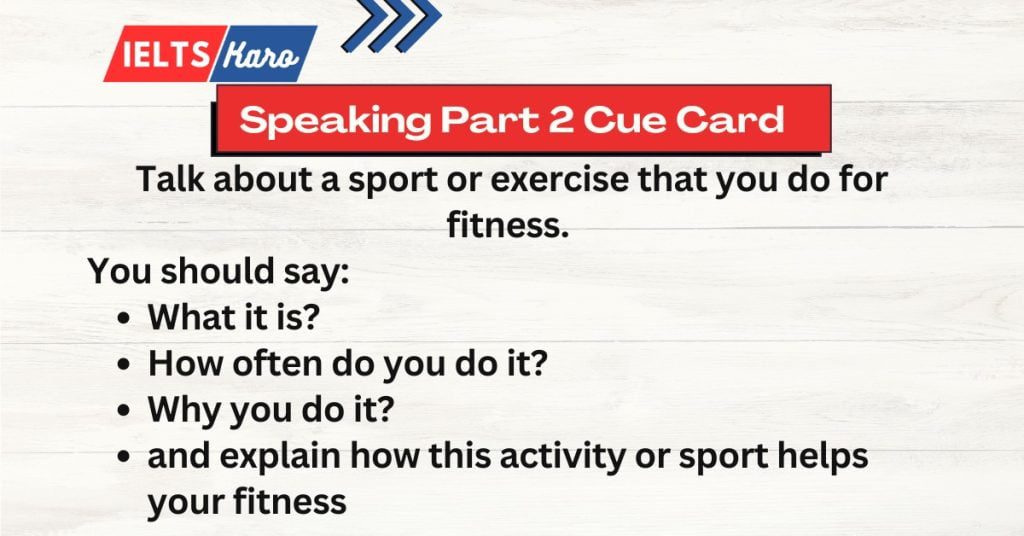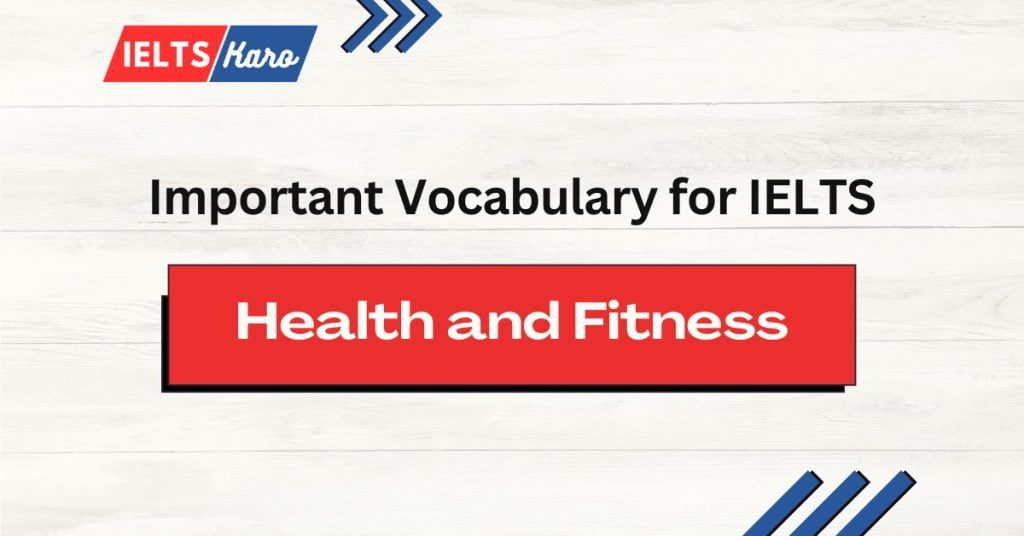Health Vocabulary for IELTS
Introduction
Health, diet and fitness are quite common topics on which you can write and speak in the IELTS Writing Task 1 and 2, and the IELTS Speaking Part 2. The following words are relevant to fitness and health vocabulary that will greatly benefit you in getting a high band score. But the health vocabulary can also extend to Reading where you can get passages on health, fitness, and related topics.
Health vocabulary is vital, given the common occurrence of health-related topics in IELTS questions. This blog will dive deep into essential vocabulary for IELTS on diet, health and fitness, providing you with the tools to enhance your language skills and boost your exam performance.
Role of Vocabulary in IELTS
Vocabulary plays a crucial role in all sections of the IELTS exam. A rich vocabulary helps you understand the reading and listening materials better, express your ideas more clearly in writing, and communicate more effectively during the speaking test.
I have written content on this website based on multiple types of vocabulary for IELTS. Hence, it is imperative for you to go through them and understand the difference between a 6.0 Band and a 7.5+ band achiever.
Key Health Vocabulary for IELTS
General Health Terms
Understanding general health terms is fundamental for discussing health-related topics. These include words like “well-being,” “symptom,” “diagnosis,” “treatment,” and “prevention.”
Common Diseases and Conditions
Familiarity with common diseases and conditions is vital. Terms like “cardiovascular disease,” “diabetes,” “asthma,” and “influenza” frequently appear in IELTS.
Medical Treatments and Procedures
Knowing medical treatments and procedures helps you describe healthcare scenarios accurately. Terms like “surgery,” “chemotherapy,” “physiotherapy,” and “prescription” are essential.
Health and Wellness
Health and wellness vocabulary encompasses areas like nutrition, exercise, and mental health. Words such as “balanced diet,” “aerobic exercise,” and “counseling” are useful.
Words with Meanings
Definition and Examples
Here are some words with their meaning on diet and fitness:
- Well-being: The state of being comfortable, healthy, or happy.
- Symptom: A physical or mental feature indicating a condition or disease.
- Diagnosis: The identification of the nature of an illness or other problem by examination of the symptoms.
Usage in Sentences
- “Regular exercise contributes significantly to overall well-being.”
- “Fever and fatigue are common symptoms of the flu.”
- “The doctor made a quick diagnosis based on the patient’s symptoms.”
Common Diseases and Conditions
Cardiovascular Diseases
Cardiovascular diseases affect the heart and blood vessels. Examples include:
- Hypertension: High blood pressure.
- Heart Attack: A medical emergency where the blood flow to the heart is blocked.
Respiratory Diseases
Respiratory diseases impact the lungs and breathing passages. Examples include:
- Asthma: A condition where the airways become inflamed and narrow.
- Pneumonia: An infection that inflames the air sacs in one or both lungs.
Infectious Diseases
Infectious diseases are caused by pathogens such as bacteria and viruses. Examples include:
- Influenza: A viral infection that attacks the respiratory system.
- Tuberculosis: A bacterial infection that mainly affects the lungs.
Chronic Conditions
Chronic conditions are long-lasting diseases that often require ongoing management. Examples include:
- Diabetes: A disease that results in high blood sugar.
- Arthritis: Inflammation of the joints causing pain and stiffness.
Medical Treatments and Procedures
Surgery and Operations
Surgery involves operative procedures to treat diseases or injuries. Common terms include:
- Appendectomy: Removal of the appendix.
- Coronary Artery Bypass: A procedure to improve blood flow to the heart.
Medication and Prescriptions
Medications are drugs used to treat or manage diseases. Key terms include:
- Antibiotics: Drugs that treat bacterial infections.
- Prescription: A doctor’s written order for medication.
Therapy and Rehabilitation
Therapy and rehabilitation are treatments aimed at recovery and improvement. Examples include:
- Physical Therapy: Treatment to restore movement and function.
- Psychotherapy: Treatment of mental health issues through psychological methods.
Health and Wellness
Nutrition and Diet
Nutrition involves the intake of food and how it affects health. Important terms include:
- Balanced Diet: A diet that includes a variety of different types of food.
- Nutrients: Substances in food that are essential for health.
Exercise and Fitness
Exercise is crucial for maintaining health and fitness. Key terms include:
- Aerobic Exercise: Physical activity that increases heart rate and breathing.
- Strength Training: Exercise designed to improve muscle strength.
Mental Health
Mental health pertains to emotional, psychological, and social well-being. Important terms include:
- Depression: A common mental disorder characterized by persistent sadness.
- Counseling: Professional guidance to resolve personal or psychological problems.
How to Use Health Vocabulary in IELTS Speaking
Follow these tips:
- Practice Regularly: Engage in conversations about health topics.
- Use Examples: Provide specific examples to illustrate your points.
- Stay Natural: Use vocabulary naturally and avoid forcing complex terms.
Example Questions and Responses – Speaking Part 1
- Question: “How important is a balanced diet?”
- Response: “A balanced diet is crucial because it provides essential nutrients that our bodies need to function properly. For example, it helps maintain energy levels and supports overall well-being.”
- Question: “What do you do to stay healthy?”
- Response: I exercise on a regular basis and and maintain my health through a balanced diet, with plenty of fruits and vegetables.
- Question: “What is your favourite exercise?”
- Response: I perform brisk walking every day for at least 30 minutes. This way, I am able to maintain my weight.
- Question: “Do you prefer home-cooked food or fast food?”
- Response: I believe that healthy eating starts from home, and I always prefer cooking and enjoying delicious meals with my family. Sometimes, I do eat from restaurants and cafes but I am careful in what I order.
- Question: “How important is a healthy lifestyle to you?”
- Response: Having a healthy lifestyle allows you to enjoy your life to the fullest because if it is filled with diseases, you will not be able to spend quality time with friends and family members.
Example Questions and Responses – Speaking Part 2

Over the last few years, I have gained a lot of weight, and to avoid any potential health issues, I have started working out. My favourite exercise is brisk walking that I enjoy everyday with my wife and family for no less than half an hour.
Due to my busy schedule, it is not possible for me to dedicate time for workout, which requires changing attire and heading to the gym. As such, I do whatever I can, and for that purposes, I have found brisk walking not only a healthy activity, but much easier than any other sports.
For the first few days, since i had no stamina, I couldn’t walk more than 15 minutes, but with the passage of time, I managed to boost my stamina and walk for at least 30 minutes. It is a healthy activity for anyone, particularly for those who either have health issues like diabetes or arthiritis, but even for those who cannot take out a lot of time from their busy schedules.
It has been more than 2 months since I started working without any gaps, and so far the results have been nothing short of amazing. For the starters, I reduced by weight by up to 7 pounds, and with changes in my diet, I do not fall short of breathing. I strongly recommend this exercise to anyone who is looking to maintain a healthy lifestyle, because at the end of the day, if you are not healthy, you cannot enjoy life to the fullest.
How to Use Health Vocabulary in IELTS Writing
Essay Writing Tips
When writing essays, incorporate by:
- Planning: Outline your essay and determine where to use specific terms.
- Variety: Use a range of vocabulary to avoid repetition.
- Context: Ensure the terms fit the context of your discussion.
How to Use Fitness Vocabulary in IELTS Reading
Reading Comprehension Strategies
Improve reading comprehension by:
- Scanning for Keywords: Identify important health and fitness terms in the text.
- Context Clues: Use surrounding words to understand unfamiliar terms.
- Summarizing: Summarize paragraphs to grasp the main ideas.
Sample Passages and Questions
- Passage: “Recent studies indicate that a balanced diet rich in nutrients can prevent chronic conditions like diabetes and heart disease.”
- Question: “What benefits does a balanced diet provide according to the passage?”
How to Use Health and Fitness Vocabulary in IELTS Listening
Listening Comprehension Strategies
Enhance listening comprehension by:
- Active Listening: Focus on understanding the main points.
- Note-taking: Write down key terms and ideas.
- Practice: Listen to health-related podcasts and videos.
Practice Exercises
- Exercise: Listen to a lecture and summarize the key points.
- Exercise: Identify and define key terms used in a news report.
Common Mistakes to Avoid
Misuse of Health Terms
Avoid using these terms incorrectly by:
- Understanding Definitions: Ensure you know the exact meaning of each term.
- Contextual Accuracy: Use terms that fit the context appropriately.
Overcomplicating Sentences
Keep sentences clear and concise. Avoid overly complex sentences that may confuse the reader or listener.
Spelling and Pronunciation Errors
Practice the correct spelling and pronunciation of health terms to avoid mistakes that can impact your score.
Improving Your Vocabulary
Daily Practice Techniques
- Flashcards: Create flashcards with health terms and definitions.
- Reading: Read health-related articles and books.
- Writing: Practice writing essays and sentences using new vocabulary.
Recommended Resources and Tools
- Online Dictionaries: Use dictionaries like Merriam-Webster or Oxford for accurate definitions.
- Language Apps: Apps like Duolingo or Anki can help reinforce vocabulary.
Practical Applications of Health Vocabulary
In Real-Life Situations
Everyday conversations can enhance your communication skills and confidence.
In Academic and Professional Contexts
It is also beneficial for academic studies and professional interactions in the medical and healthcare fields.
Conclusion
Expanding your health vocabulary is a valuable investment in your IELTS preparation. It not only helps you perform better on the exam but also equips you with the language skills needed for academic and professional success. Keep practicing, stay curious, and continue to explore the fascinating world of health-related language.
FAQs
What are some essential health vocabulary words for IELTS?
Essential words include “well-being,” “symptom,” “diagnosis,” “treatment,” “prevention,” “hypertension,” “diabetes,” “surgery,” and “nutrition.”
How can I improve my vocabulary for the IELTS exam?
Improve your vocabulary by reading health-related materials, practicing with flashcards, using language learning apps, and writing essays on health topics. The best ways to improve your health vocabulary for ielts is by reading books and watching Youtube videos on documentaries about health.
Can using health vocabulary improve my IELTS score?
Yes, using a rich and accurate health vocabulary can improve your scores in the speaking and writing sections by demonstrating your language proficiency and ability to discuss complex topics.
What resources are best?
Recommended resources include online dictionaries, language learning apps like Duolingo, health-related articles, and IELTS preparation books.
How often should I practice for IELTS?
Consistent daily practice is ideal. Spend at least 15-30 minutes each day reviewing and using new health vocabulary to build and retain your knowledge.
Here are some links to health and fitness content:





